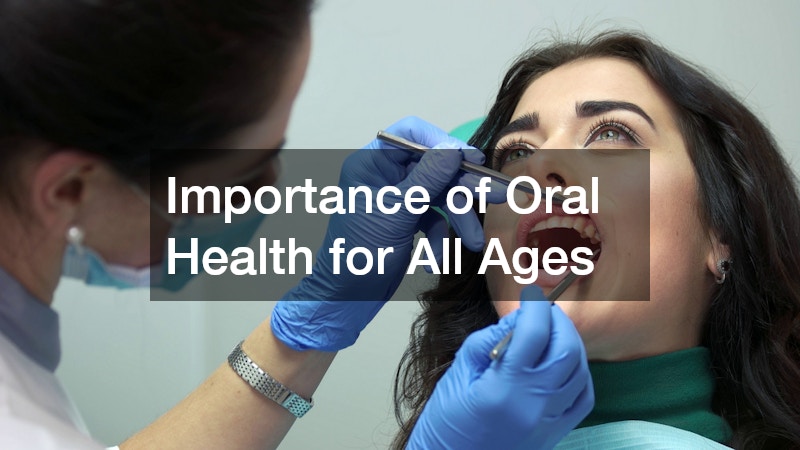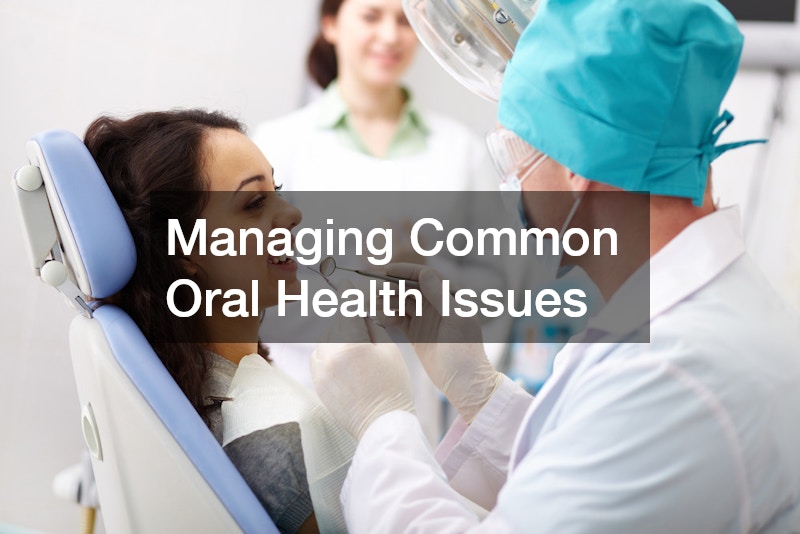Oral health is a crucial aspect of overall well-being and it’s essential for every member of the family. This article explores a variety of topics related to oral wellness, offering practical tips and insights. By paying attention to health through oral wellness, families can ensure a lifetime of healthy smiles.

Understanding the Importance of Oral Health for All Ages
Oral health is important for individuals of all ages, reflecting its critical role in general dentistry. From childhood to older age, maintaining good oral hygiene is key to preventing various dental issues. For families, a family dental office often provides a comprehensive approach to dental care, ensuring every member receives proper attention.
Good oral health contributes to overall well-being, affecting more than just the teeth and gums. Poor oral hygiene can lead to issues such as gum disease, which has been linked to systemic health problems. Regular visits to a general dentist service can help diagnose and prevent these conditions.
Teaching children the importance of oral hygiene from an early age sets the foundation for a lifetime of healthy habits. Pediatric dentists play a crucial role in this process, offering specialized care tailored to the needs of young patients. Encouraging routine visits to the dentist office for check-ups and cleanings is equally vital for maintaining optimal oral health throughout life.
The Role of Fluoride in Oral Health for Every Age
Fluoride is an essential mineral that plays a significant role in health through oral wellness and maintaining strong, healthy teeth throughout life. It helps prevent tooth decay by strengthening tooth enamel, making it more resistant to the acids produced by bacteria in the mouth. Fluoride is particularly important during childhood when teeth are still developing. Early exposure to fluoride helps build a strong foundation for permanent teeth, significantly reducing the risk of cavities.
For adults, fluoride remains important in preventing decay, especially as enamel naturally weakens with age. Fluoride helps to remineralize the enamel and can reverse early stages of tooth decay, preventing more extensive dental treatments at a general dentistry office. In addition to its role in cavity prevention, fluoride also supports oral health by reducing tooth sensitivity, which can be a common issue for adults and seniors.
Fluoride can be found in various forms, including drinking water, toothpaste, mouth rinses, and professional treatments from your dentist. It is safe and beneficial for people of all ages when used as directed. However, it’s important to ensure proper use, as excessive fluoride intake can cause dental fluorosis, which can affect the appearance of teeth. For the best results, talk to your dentist about appropriate fluoride options for your family’s needs.
Daily Habits That Promote Healthy Teeth and Gums
Establishing daily habits for health through oral wellness is fundamental in maintaining healthy teeth and gums. Brushing teeth at least twice a day with fluoride toothpaste and flossing daily are essential practices. Many dentist offices recommend using an electric toothbrush for more effective plaque removal and prevention of sensitive teeth issues.
In addition to brushing and flossing, using mouthwash can enhance oral hygiene by reducing bacteria and freshening breath. It’s also important to replace toothbrushes every three months or sooner if bristles become worn. These simple yet effective habits contribute significantly to maintaining oral health.
An often overlooked aspect is the technique used during brushing and flossing. Proper brushing involves gentle circular motions to cover all tooth surfaces, while flossing should be done carefully to avoid damaging the gums. Consistency and correct techniques backed by guidance from a general dentist service are critical in preventing dental issues.

How Diet Plays a Role in Oral Wellness
Diet significantly impacts health through oral wellness, as the foods we consume can affect our teeth and gums. Sugary and acidic foods and drinks can contribute to tooth decay and erosion, particularly in those with sensitive teeth. Limiting such items and opting for nutritious alternatives is recommended by experts in oral hygiene.
Calcium-rich foods, such as dairy products, are beneficial for maintaining strong teeth and jawbones. Incorporating these into a balanced diet supports general dentistry efforts in preventing dental problems. Additionally, crunchy fruits and vegetables can aid in cleaning teeth naturally and stimulating saliva production.
Hydration is essential for oral wellness, as water helps wash away food particles and neutralize acids. Drinking plenty of water, especially after meals, can prevent plaque buildup and protect against dental issues. A diet conducive to oral health complements regular visits to the cosmetic dentist for aesthetic concerns.
The Link Between Oral Health and Overall Well-Being
Oral health is closely linked to overall well-being, with implications for general health conditions. Researchers have identified connections between periodontal diseases and systemic issues like heart disease and diabetes. This emphasizes the importance of prioritization in dental care from a reputable family dental office.
Regular oral hygiene practices and check-ups can prevent infections that might otherwise spread beyond the mouth. Maintaining healthy gums and teeth can promote a healthier body overall, supporting general dentist service objectives. Individuals are encouraged to be vigilant about their oral health to safeguard against broader health problems.
Beyond physical health, health through oral wellness also affects emotional and social well-being. Poor oral hygiene can lead to bad breath and aesthetic concerns, impacting self-confidence and social interactions. Therefore, ensuring good oral health through consistent routines and specialist visits is key to holistic well-being.
Regular Dental Check-Ups: A Key to Prevention
Regular dental check-ups play a crucial role in the prevention of dental problems. These visits allow for early detection of potential issues, such as cavities or gum disease. A trusted dental care provider can offer personalized advice and treatment plans for each family member’s unique needs.
During routine check-ups, professional cleanings help remove plaque and tartar buildup that regular brushing may miss. These sessions not only polish teeth but also provide an opportunity to receive tailored oral hygiene tips. Adhering to recommended check-up intervals is vital for maintaining oral health.
Preventive dentistry is an integral component of overall health care, emphasizing the need for regular evaluations. These visits can help forestall major dental procedures by addressing issues before they escalate. Consulting with a general dentist service can ensure that preventive measures are effectively integrated into each individual’s routine for health through oral wellness.

Managing Common Oral Health Issues: Prevention and Treatment
Oral health issues are common at every age, but most can be managed or prevented with proper care. One of the most widespread problems is tooth decay, which occurs when bacteria in the mouth produce acids that break down tooth enamel. To prevent cavities, maintain a consistent oral hygiene routine of brushing twice a day with fluoride toothpaste and flossing daily. Regular dental check-ups are also crucial for early detection and treatment of decay before it becomes more severe.
Gum disease, or periodontal disease, is another common oral health issue. Early symptoms include redness, swelling, and bleeding of the gums. Proper brushing, flossing, and regular cleanings by a dentist or hygienist can prevent gum disease from progressing. In its advanced stages, gum disease can lead to tooth loss, so it’s essential to address it early.
Tooth sensitivity is another common issue, often caused by worn-down enamel or gum recession. Using a toothpaste formulated for sensitive teeth and visiting the dentist for treatments can help reduce discomfort.
Other health through oral wellness concerns like dry mouth, oral infections, and teeth grinding can often be managed with targeted treatments, such as using saliva substitutes or mouthguards. As with all oral health issues, regular visits to your dentist will help ensure any problems are caught early and effectively treated.
Oral Care Tips for Children: Starting Early
Establishing oral care habits early in life is essential for lifelong dental health. Pediatric dentists focus on creating a comfortable environment for children to receive dental care and learn proper techniques. Teaching children the importance of brushing and flossing from a young age promotes positive habits.
Parents play a significant role in encouraging their children’s oral hygiene by modeling good practices. Supervising children’s brushing routines can help ensure they are using correct techniques, especially in reaching the back teeth. Incorporating fun elements like colorful toothbrushes or flavored toothpaste can further engage children in their oral care routine.
Encouraging regular dental check-ups from an early age instills the importance of oral health. These visits allow pediatric dentists to monitor development and address concerns such as cavities or teeth alignment. A strong foundation in oral care helps prevent issues as children transition into adolescence.
Teenagers and Oral Hygiene: Tips for Effective Care
Teenagers face unique challenges when it comes to maintaining health through oral wellness. With busy schedules and dietary changes, it’s easy for oral care to slip through the cracks. Encouraging teens to prioritize general dentistry practices ensures they maintain healthy teeth and gums despite their hectic lifestyles.
Oral hygiene in adolescence is crucial, particularly as teens are more susceptible to cavities and gum issues. Emphasizing the importance of brushing twice daily and flossing can reinforce existing habits. Teens may also be interested in cosmetic dentist services for aesthetic treatments, motivating them to maintain consistent oral care.
Teenagers should be encouraged to make smart dietary choices that benefit their oral health. Limiting sugary snacks and drinks can reduce the risk of cavities, while choosing healthier alternatives can support overall well-being. Continuous dialogue about oral hygiene importance and regular dentist visits help reinforce these practices as they mature into adulthood.

Maintaining Oral Health in Adulthood: Best Practices
Adulthood presents its own set of oral health considerations, requiring attentive care and regular check-ups. Adults should be vigilant about their oral hygiene, ensuring they brush and floss daily to prevent periodontal diseases. Visiting a general dentist service regularly for cleanings and exams is key to long-term oral health.
As adults age, they may experience changes in their teeth and gums, necessitating adjustments in their oral care routines. Seeking advice from a cosmetic dentist for issues like discoloration or alignment can improve both aesthetic appearance and self-confidence. These appointments should be complemented by maintaining healthy lifestyle choices, such as a balanced diet and not smoking.
Managing stress is also an important aspect of adult oral care, as stress can exacerbate gum disease and other dental issues. Techniques like mindfulness and proper time management can help mitigate the effects of stress on oral health. Adults should actively engage with their dental care professionals to address specific concerns and uphold their oral wellness.
Senior Oral Care: Unique Challenges and Solutions
Senior health through oral wellness presents specific challenges due to age-related changes and potential health issues. Conditions such as dry mouth or gum recession can affect oral health, highlighting the importance of tailored dentist office visits. Regular assessments by a dental care provider are crucial in addressing these unique concerns.
Older adults may benefit from specialized treatments such as dental implants to replace missing teeth. These solutions can restore functionality and improve quality of life by allowing seniors to eat and speak comfortably. Senior oral care solutions should focus on both preventive measures and restorative techniques to ensure comprehensive care.
The management of sensitive teeth is another common issue among seniors. Using products specifically formulated for sensitivity can alleviate discomfort and protect tooth enamel. Gentle oral hygiene practices, coupled with routine consultations, support optimal oral health in older adulthood.
Choosing the Right Dental Products for Your Family’s Needs
Selecting the appropriate dental products for your family contributes significantly to maintaining health through oral wellness. Options like fluoride toothpaste, floss, and mouthwash should be chosen based on family needs such as sensitivity or gum health. Consulting with a general dentist service can provide recommendations tailored to individual requirements.
For those with sensitive teeth, selecting gentle products that offer protection and relief is essential. Many brands offer specialized options that help reduce pain and fortify tooth enamel. Dental products should support comprehensive oral care routines, meeting the diverse needs and preferences of all family members.
Regular evaluation of dental products ensures they align with evolving oral health needs. New advancements and personal health changes may necessitate updates to a family’s dental care routine. Consistent communication with a family dental office can aid in keeping up with the latest suitable options available in dental products.
Maintaining health through oral wellness is a lifelong commitment and integral to overall health. By understanding the various elements of oral care and implementing these tips, each family member can achieve optimal oral health. Regular visits to dentist offices, informed dietary choices, and suitable dental products form the cornerstone of effective dental care for the entire family.


